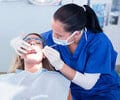Who Needs Dental Premedication?
Often, patients who need dental premedication have certain systemic conditions, meaning conditions that affect the entire body. According to a report in The Journal of the American Dental Association, dentists may recommend antibiotic prophylaxis for patients who are at risk of infective endocarditis (IE), an infection of the heart lining. To lower your chances of developing IE, your dentist or healthcare provider will take special consideration if you have any of the following conditions:
- A prosthetic heart valve or a repaired heart valve
- A history of IE
- A heart disease present from birth or a heart defect
- A heart transplant that results in valve problems
Patients who have prosthetic joints, such as artificial hips, knees, shoulders or elbows, may or may not need to take antibiotic prophylaxis depending on the recommendation from their healthcare provider and the health of their immune system. Other conditions that may affect a patient's ability to fight infections include diabetes, rheumatoid arthritis and cancer.
Procedures Requiring Dental Premedication
During some dental procedures, bacteria can enter the patient's body through the gum tissue and blood stream. While many individuals' immune systems are strong enough to fight the bacteria and stop infections, others' immune systems may need extra protection from antibiotics before a dental procedure.
Any medical condition that predisposes patients to a bacteria-induced infection should be considered a candidate for premedication, reports the American Dental Association. The dental practitioner or their healthcare provider determines if the patient requires this therapy if they are at risk for infection.
Commonly Used Antibiotics in Dentistry
If you are required to take premedication, the patient will take the antibiotic orally one hour prior to the dental appointment. The antibiotic will work to fight germs that may enter the patient's system through the gum tissue and into the blood stream during the dental procedure.
The Journal of the California Dental Association recommends 2 grams of amoxicillin for adults or 50 milligrams per kilogram of weight for children. If the patient has an allergy to amoxicillin, their healthcare provider may prescribe other antibiotics, such as clindamycin, cephalexin or azithromycin. The benefits that antibiotics provide are they are easy to take, fast-acting and kill bacteria that may cause an infection in the body. Antibiotics are generally taken with food to prevent side effects, such as an upset stomach, nausea, diarrhea and may build a resistance to bacteria according to Medical News Today. There are risks associated with any medication your dentist or healthcare provider will prescribe the patient - if they believe the potential benefits outweigh any potential risks.
Patients should maintain a thorough oral care routine of brushing twice daily and flossing once daily and follow the recommendations of their healthcare professionals — both dental and medical — to keep their mouth and body healthy. Please consult your primary care physician, cardiologist or orthopedic surgeon to determine if you require premedication prior to your regularly scheduled twice yearly dental visits.
Oral Care Center articles are reviewed by an oral health medical professional. This information is for educational purposes only. This content is not intended to be a substitute for professional medical advice, diagnosis or treatment. Always seek the advice of your dentist, physician or other qualified healthcare provider.
ORAL HEALTH QUIZ
What's behind your smile?
Take our Oral Health assessment to get the most from your oral care routine
ORAL HEALTH QUIZ
What's behind your smile?
Take our Oral Health assessment to get the most from your oral care routine
Join Us
Get the best of your oral health routine and take it to the next level with expert advice, recommendations, products and solutions and special offers.
Join Us
Get the best of your oral health routine and take it to the next level with expert advice, recommendations, products and solutions and special offers.















